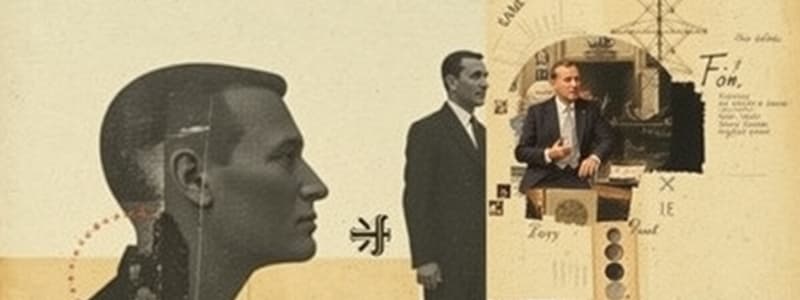Podcast
Questions and Answers
What is one price of leadership mentioned in the content?
What is one price of leadership mentioned in the content?
- Physical exhaustion
- Financial loss
- Criticism (correct)
- Isolation from others
How does the author suggest one should view criticism when placed in a leadership role?
How does the author suggest one should view criticism when placed in a leadership role?
- As dispensable feedback
- As a necessary aspect of success (correct)
- As an indicator of popularity
- As a sign of failure
What comparison does the author make to emphasize the burden of leadership?
What comparison does the author make to emphasize the burden of leadership?
- Running a marathon alone
- Leading a complaint-riddled journey like Moses (correct)
- Managing a busy restaurant
- Being a coach of a losing team
What was the barber's attitude towards the salesman’s plans to visit Rome?
What was the barber's attitude towards the salesman’s plans to visit Rome?
According to the content, what kind of response did the author receive from his friend regarding criticism?
According to the content, what kind of response did the author receive from his friend regarding criticism?
What did the pope say to the salesman after he kissed his ring?
What did the pope say to the salesman after he kissed his ring?
According to the content, why is it essential for leaders to know themselves?
According to the content, why is it essential for leaders to know themselves?
Which statement best reflects a common response to criticism as described in the content?
Which statement best reflects a common response to criticism as described in the content?
What is described as a primary responsibility for leaders when facing criticism?
What is described as a primary responsibility for leaders when facing criticism?
Which philosopher is quoted regarding the ease of avoiding criticism?
Which philosopher is quoted regarding the ease of avoiding criticism?
How should leaders differentiate between constructive and destructive criticism?
How should leaders differentiate between constructive and destructive criticism?
What might represent a flaw the author recognizes in himself?
What might represent a flaw the author recognizes in himself?
What should leaders NOT do when receiving criticism?
What should leaders NOT do when receiving criticism?
What is a common behavior of leaders who have a negative attitude towards criticism?
What is a common behavior of leaders who have a negative attitude towards criticism?
What aspect of criticism does the advice about greeting it with an open mind relate to?
What aspect of criticism does the advice about greeting it with an open mind relate to?
Flashcards
Price of Leadership
Price of Leadership
The unavoidable negative aspects that come with being a leader, such as criticism.
Criticism as Attention
Criticism as Attention
When you are in a leadership position, your actions and decisions will attract scrutiny and criticism, even if you are successful.
Handling Criticism
Handling Criticism
The ability to receive and manage criticism constructively without letting it discourage you.
Moses Analogy
Moses Analogy
Signup and view all the flashcards
Overcoming Criticism
Overcoming Criticism
Signup and view all the flashcards
Aristotle's View on Criticism
Aristotle's View on Criticism
Signup and view all the flashcards
Facing Criticism as a Leader
Facing Criticism as a Leader
Signup and view all the flashcards
Knowing Yourself as a Leader
Knowing Yourself as a Leader
Signup and view all the flashcards
Criticism: A Reality for Leaders
Criticism: A Reality for Leaders
Signup and view all the flashcards
Changing Yourself as a Leader
Changing Yourself as a Leader
Signup and view all the flashcards
Constructive vs. Destructive Criticism
Constructive vs. Destructive Criticism
Signup and view all the flashcards
The Source of Criticism
The Source of Criticism
Signup and view all the flashcards
How Criticism is Delivered
How Criticism is Delivered
Signup and view all the flashcards
Motivation Behind Criticism
Motivation Behind Criticism
Signup and view all the flashcards
Attitude Towards Criticism
Attitude Towards Criticism
Signup and view all the flashcards
Seagull Leadership
Seagull Leadership
Signup and view all the flashcards
Study Notes
Leadership and Criticism
- Criticism is inevitable for leaders, especially those in the forefront
- Leaders are often the target of criticism, regardless of personal qualities
Handling Criticism
- Criticism can be discouraging, but it's a price of leadership
- Leaders must learn to handle criticism constructively
- Unrealistic expectations of praise without criticism are a common issue
- The barber's criticism of the salesman's trip, followed by the salesman's success, illustrates that one can be better off accepting criticism
Four-Step Process for Handling Criticism
- Know Yourself (Reality Issue):
- Leaders are targeted for criticism, whether deserving or not
- Self-reflection is key to separating personal criticism from position-related remarks
- Examples of personal shortcomings: impatience, unrealistic views of time, dislikes to spend time with emotional concerns, overestimate others, quick to delegate responsibilities, desires many options, dislike of rules, fast prioritization process, rapid processing
- Recognize the majority of criticism is often directed toward the person rather than the position
- Knowing oneself takes time and effort
- Change Yourself (Responsibility Issue):
- Address accurate criticism by examining oneself and making changes
- Distinguish constructive from destructive criticism
- Consider the source, delivery, and motive behind the criticism
- Criticism from a wise person outweighs unqualified approval
- Feedback delivered with kindness is more constructive than judgmental remarks
- Motivations behind criticism can include self-interest, help or both
- Maintaining a positive attitude is essential while accepting constructive remarks;
- Don't be defensive, look for truth, make changes, take the high road to resolve problems
- Accept Yourself (Maturity Issue):
- Maturity involves acceptance of oneself, regardless of others' perceptions
- Focus on self-improvement with awareness of strengths and limitations
- True confidence stems from self-acceptance rather than external validation.
- "The easiest thing to be in the world is you. The most difficult thing to be is what other people want you to be. Don’t let them put you in that position."
- Leaders need to be themselves while still striving for improvement
- Be who you are, not how others expect you to be
- Forget Yourself (Security Issue):
- Secure leaders focus on others rather than themselves when facing criticism
- Initiate contact with critics, showing value in all individuals
- Prioritizing others to handle negativity and disagreements more effectively
- Security fosters the ability to take the high road, responding graciously to criticism.
- Taking criticism as an opportunity for improvement is beneficial to personal and professional growth.
- Security in one's position and purpose enables a mature response to criticism, focusing on betterment, not personal defense.
Application Exercises
- Self-assessment, self-awareness and understanding self-deficiencies
- Recognizing insecurities and defensiveness, processing criticism without immediate dismissal
- Utilizing three questions regarding criticism: who, how, and why
- Mentorship and observations: Observing how others respond to criticism to provide concrete improvement suggestions
Studying That Suits You
Use AI to generate personalized quizzes and flashcards to suit your learning preferences.
Description
Explore the dynamics of leadership and the inevitable criticism that comes with it. This quiz sheds light on how leaders can constructively handle criticism and emphasizes the importance of self-reflection. Learn about the four-step process for dealing with criticism effectively.




